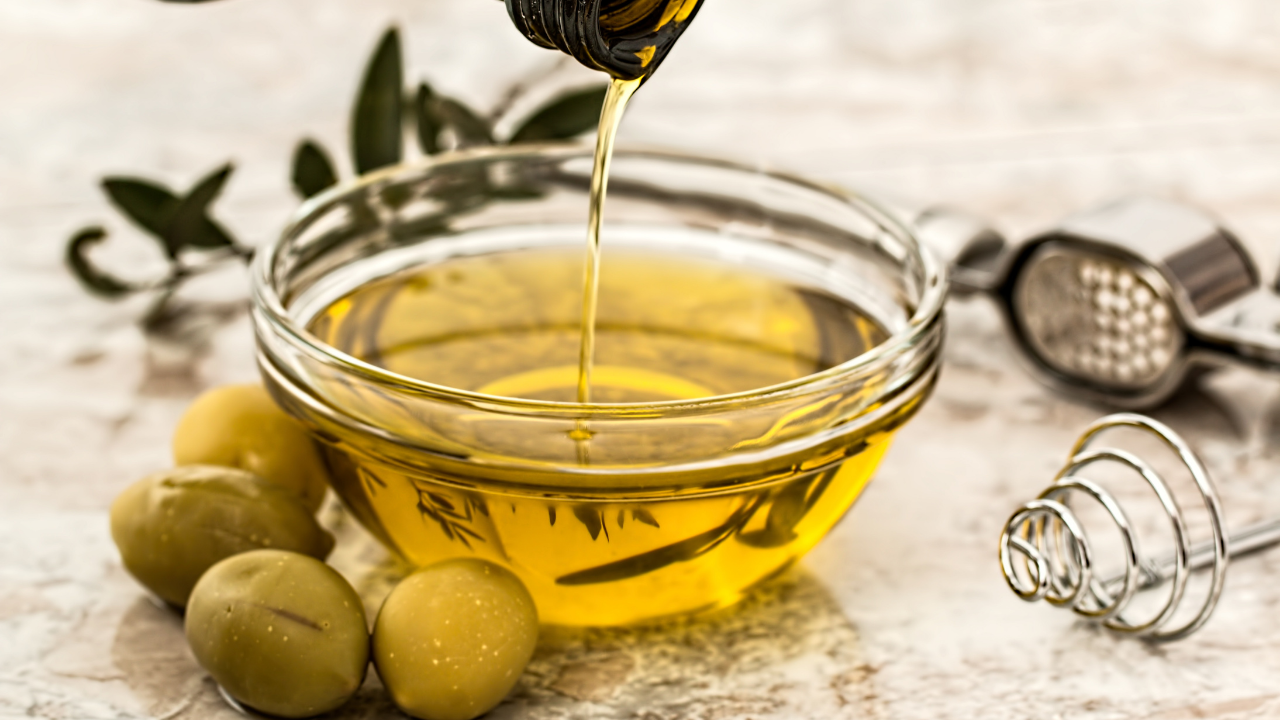Eat Olive Oil to Reduce Anxiety
Jan 11, 2021
Olive oil made from European olives (Olea europaea) grown in the Mediterranean region is full of vitamins and other nutrients. Extra-virgin olive oil, which is derived from the first pressing of the olives, has the most delicate flavor and most potent antioxidant benefits.
The nutritional composition of olive oil is complex. Rich in MUFAs, it is composed mainly of mixed triglyceride esters of oleic acid, palmitic acid, and other fatty acids; traces of squalene and sterols; and other antioxidants—tyrosol, hydroxytyrosol, oleocanthal, oleuropein, vitamin E, and carotenoids.
Oleuropein prevents the oxidation of LDL (aka “bad cholesterol”) particles.1 Everybody knows we are supposed to keep our bad cholesterol in check and raise our good cholesterol (HDL) if we can. But where this LDL-limiting trait becomes relevant to anxiety is in the ability of oleuropein (OLE) to reduce anxiety-like responses by activating neurons that regulate the neurotransmitter serotonin and some neuropeptides. Neuropeptides help the neurons communicate with each other. They are signaling molecules that influence the activity of the brain and the body in specific ways. In one study, daily OLE administration was demonstrated to significantly reduce anxiety. Among other things it did, OLE blocked a stress-induced decrease in serotonin. This finding suggests that OLE has anxiolytic-like effects that could be helpful to people with PTSD and anxiety.2
Researchers have also looked into whether olive oil can modulate the serotonin, dopamine, norepinephrine, epinephrine, and/or histamine neurotransmitter systems in the brain. Neurochemical results show that repeated administration of olive oil decreases levels of (5-hydroxytryptamine (5-HT), 5-hydroxyindoleacetic acid (5-HIAA), and L-dopa and increases homovalinic acid (HVA). These findings suggest that olive oil has neuroprotective effects and reduces certain metabolically linked behavioral deficits. The researchers concluded that olive oil “could be used as a therapeutic substance for the treatment of depression and anxiety.”3
Olive oil is rich in both omega-3 and omega-6 fatty acids and helps to balance them in the body. It supports the central nervous system by aiding proper nerve function and increasing serotonin levels. This gives it therapeutic value for treating major depression.4
Olive oil also could play an adaptive role in stressful times as it has been shown to reduce even the perception of stress.5
Also, oleuropein derivatives found in olive oil, especially hydroxytyrosol, have been shown to have an antioxidant capacity higher than that of other known antioxidants, including vitamins E and C.6
Ways of Incorporating Olive Oil in Your Anxiety-Free Kitchen
- Olive oil has a medium smoke point, so use it for cooking foods at medium heat like stir-fried vegetables.
- Use olive oil as a base for salad dressing. You can’t go wrong by mixing olive oil and vinegar, like apple cider vinegar, for a delicious dressing, or olive oil and lemon.
- If you don’t like the taste of olive oil, consider chopping up the leaves and tossing them into a salad. Or making stuffed grape leaves like they do in Mediterranean countries. (The leaves of the olive tree have long been used in folk healing in France, Greece, Italy, Morocco, Spain, Tunisia, and Turkey.7 Olive leaves have been used in the human diet in the form of extracts, herbal teas, and powders for centuries.)
Anxiety-Free Recipes in my new book with Olive Oil
- Basic Salad Dressing
- Green Sprout Salad
- Guacamole Greens Salad
- Grounding Lentil Soup with Avocado and Ginger
Sources:
1. E. Coni, et al., “Protective Effect of Oleuropein, an Olive Oil Biophenol, on Low Density Lipoprotein Oxidizability in Rabbits,” Lipids, vol. 35, no. 1 (January 2000), pp. 45–54, doi: 10.1007/s11745-000-0493-2.
2. B. Lee, et al., “Oleuropein Reduces Anxiety-Like Responses by Activating of Serotonergic and Neuropeptide Y (NPY)-ergic Systems in a Rat model of Post-Traumatic Stress Disorder,” Animal Cells and Systems, vol. 22, no. 2 (2018), pp. 109–17, doi: 10.1080/19768354.2018.1426699.
3. T. Perveen, et al., “Role of Monoaminergic System in the Etiology of Olive Oil Induced Antidepressant and Anxiolytic Effects in Rats,” ISRN Pharmacology (2013), p. 615685, doi: 10.1155/2013/615685.
4. A.C. Logan, “Neurobehavioral Aspects of Omega-3 Fatty Acids: Possible Mechanisms and Therapeutic Value in Major Depression,” Alternative Medicine Review, vol. 8, no. 4 (November 2003), pp. 410–25, PMID: 14653768.
5. J. Bradbury, S.P. Myers, and C. Oliver, “An Adaptogenic Role for Omega-3 Fatty Acids in Stress: A Randomised Placebo-Controlled Double-Blind Intervention Study (Pilot) [ISRCTN22569553],” Nutrition Journal, vol. 3 (November 2004), p. 20, doi: 10.1186/1475-2891-3-20.
6. F. Paiva-Martins and M.H. Gordon, “Interactions of Ferric Ions with Olive Oil Phenolic Compounds,” Journal of Agriculture and Food Chemistry, vol. 53, no. 7 (April 6, 2005), pp. 2704–9, doi: 10.1021/jf0481094.
7. F. Hadrich, et al., “Evaluation of Hypocholesterolemic Effect of Oleuropein in Cholesterol-Fed Rats,” Chemico-Biological Interactions, vol. 252 (May 25, 2016), pp. 54–60, doi: 10.1016/j.cbi.2016.03.026.


